LABTECH’s VIRTUAL TVET© PROGRAM
Labtech is creating a system for 21st Century TVET training delivery for employable skills: from theory to practical, from virtual to hands-on, from cloud to reality.
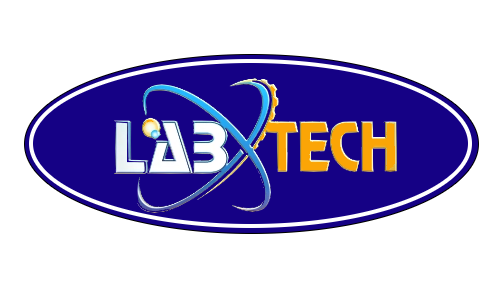
Thank you for discovering Virtual TVET !
The Labtech-Academy features the latest technical and vocational content available online.
Please address your feedback via email to:
What is Virtual TVET ... and who is it for?
Virtual TVET© is the latest generation of digital content for TVET designed by Labtech. It uses advanced game-based technology to assist students to see how things are constructed, how they work and to understand the relationships between systems. At Labtech we are pioneering new ways of visual learning which use advanced 3D gaming technology. Our aim is to provide learning that both complements and goes beyond traditional lab/workshop based training programs. Up until now we have only deployed our content inside client schools as it runs on local devices/servers offline. We are in the process of converting our digital content to run on the Labtech-Academy site which is perhaps the first online system to do this.
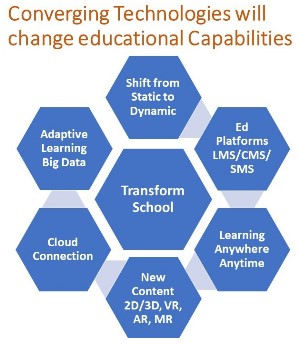
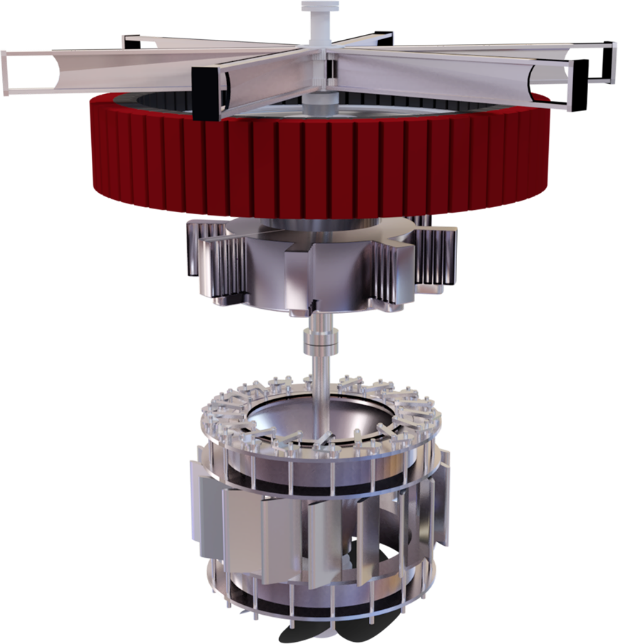

Virtual TVET is designed as self-paced digital learning that is complementary to a wide range of existing curriculums around the world. It is mostly used as supplemental material but full subject areas (with 50 or more topics) can be considered to be quite a comprehensive complete course (all is needed is practice). The Labtech-Academy can be used by:
- Secondary Schools that wish to implement STEM
- Secondary Vocational High Schools
- Polytechnics and Technical Institutes
- Engineering Universities.
- Industries wishing to update their training programs.
- Students that are taking a course at a Vocational school or Technical Institute and wish to supplement their learning and to benefit from the engineering visualizations to deepen their knowledge.
- Teachers can also use our digital content to supplement their lectures and display them to the students to explain various aspects of technology. This will also enable teachers to shift their students learning online and off campus.
- Industry and businesses can use the Virtual TVET program to provide updating or refresher courses for their staff for professional development. The assessment features allow them to test prior learning.
- Individuals who wish to know more about technology or would like to acquire a new skill or improve their employability.
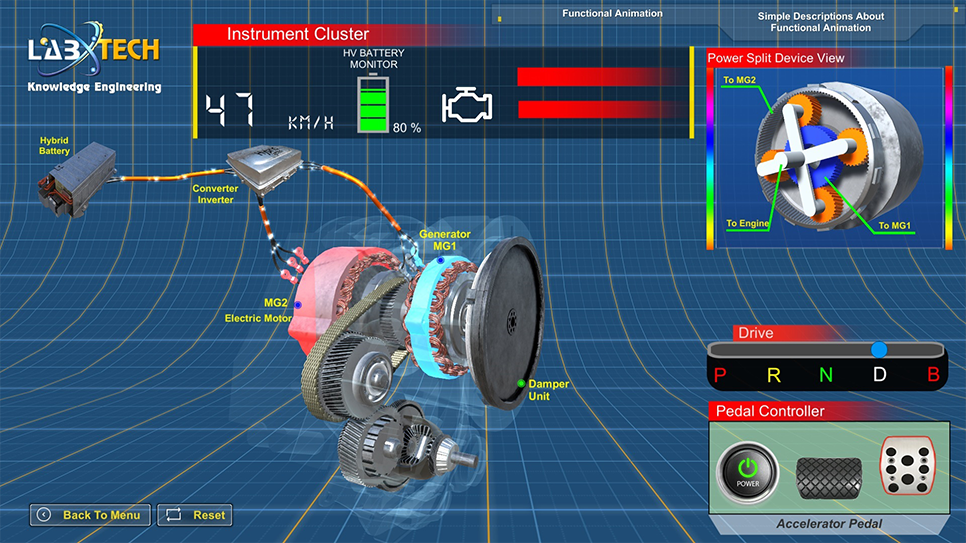
Subjects and Topics
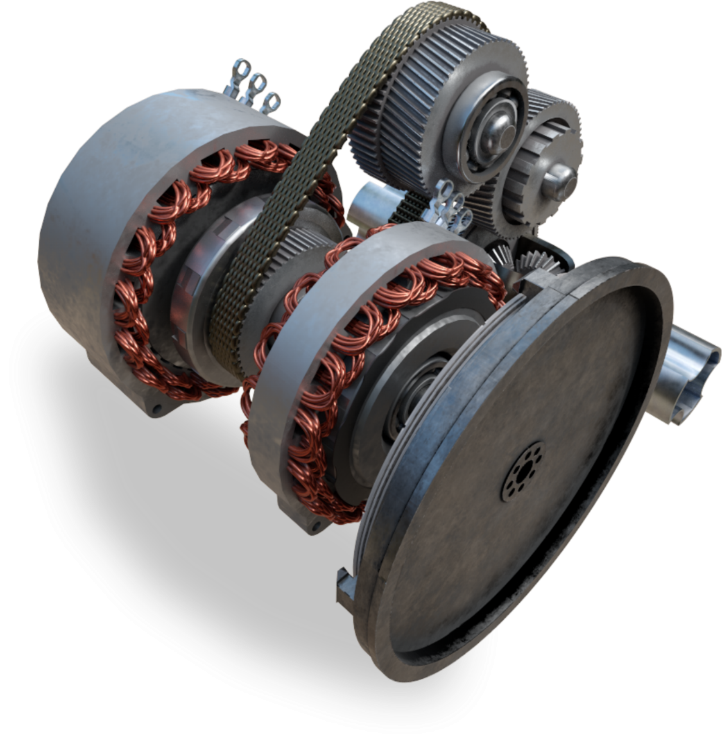
Labtech’s Virtual Digital Content is designed to be concise, complete and stand-alone learning modules that facilitate learning in topics that are typically included most Technical/Vocational curriculums or STEM Programs.
Each Topic module deals with a distinct and single element of the curriculum and provides enhanced learning materials for the student to explore and learn about these topics. They are provided in such a way that they can be used as supplemental learning materials to enhance the learning process or they can be incorporated into the main classroom activities.
The Labtech-Academy is starting to initially release content for Automotive, HVAC, Electrical and sTEm Tech subjects. The Automotive and HVAC will soon have 50 or over topic modules each as our development of these areas is already quite advanced, this will be complete by early to mid-June. Topics for the Electrical and sTEm will be uploaded as they are developed and our team is working hard on them now, this will take a few months for them to be complete. Later-on we shall add Electronics and ICT to the subject areas. We map the topics of each subject area to international standard curriculums from around the world (USA, UK, Australia, Malaysia for example). You can think of each topic like a chapter in a book and it comes complete with learning objectives, theory, interactive learning elements and assessments.
Our STEM program focuses on the Technology and Engineering aspect of STEM, wo we write it as sTEm. You can say it is for applied technology so we relate the technical applications and topics to science and math. This is quite different from other STEM programs that in many cases emphasize mostly Science and Math, they might be spelled like SteM. So if you wish to enhance your existing STEM program with T & E or have a program that is Technology and Engineering oriented then we have just what you need.
Generic Models - We make the content as generic as possible, and each component or system represents what is commonly used in today’s industry. It is not our objective right now to provide training on all the variations of technology used by specific industry or brand. However, some topics are based on specific popular models or brands which have unique technology. In these cases, we try to select technology or market leaders for these choices. For example, our Hybrid Vehicle course is based on the Toyota Prius and the Electrical Vehicle that is under development is based on the Nissan Leaf.
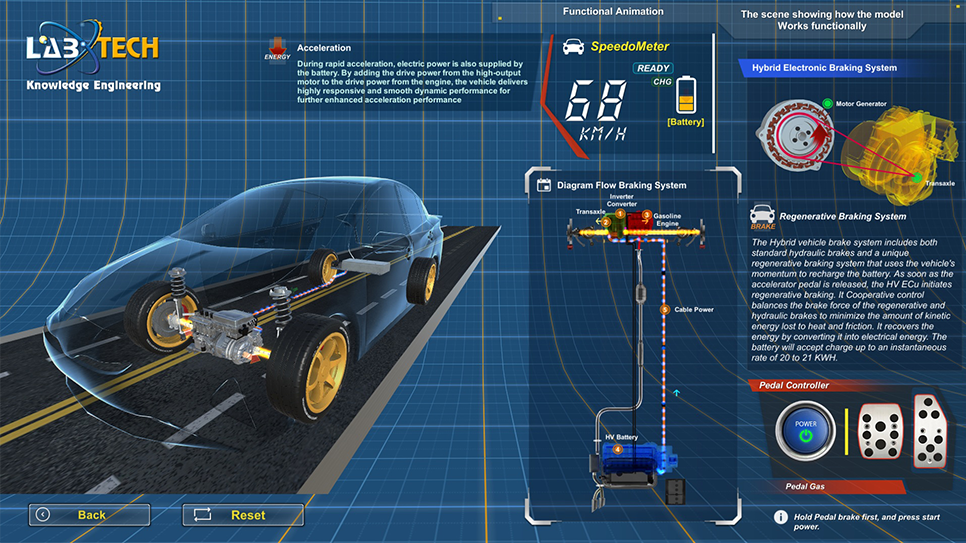
What are the Educational Aims?
We have designed the program to be self-paced so that the student may journey through the information and activities in their own way. They can practice the exercise and review the information as much as they like in order to gain a deeper understanding or mastery over each area. We design the content so that the major portions are interactive and use visual learning techniques as this improves both comprehension and retention.
Our assessments are both formative and summative. The teachers will like the summative assessments as these will give a score on the learner’s progress. But the formative assessments are for the student’s benefit and they are an important part of the learning program. They test to student to see what they do not know and then allow the learner to revisit prior information or exercises to strengthen those parts in order to achieve a more complete understanding of the topic. Studying TVET is challenging as it is about competency (unlike most academic subjects). It is necessary to have a thorough understanding of the key topics in order to achieve true competency. Our Virtual TVET Students normally do well just by studying the information and the interactive animations and simulations. But the formative assessment is like turbo charging the learning process and leads the student to a fuller understanding and mastery.
We consider the following points when selecting our topics and designing how to present them in the best possible and most useful way for learning:
- Improving Comprehension: Targeting the areas that students have difficulty understanding. This include principles, theory, concepts, relationships and how things work.
- Free up Teacher Time: Targeting activities that are time consuming, repetitive or tedious for the teachers to teach or demonstrate. For example, like assembly/disassembly exercises which take repeated demonstrations.
- Strengthen Foundational Knowledge: Improving comprehension of the foundational Knowledge of technology and its applications.
- Pre-Lab Preparation: To develop and prepare students in advance of practical training tasks in the lab. Thereby learners will be more ready to work once they enter the lab. This reduces time spent in workshop learning practical skills and can lead to increased student throughput in the lab/workshop as better preparation speeds up learning activities.
- More time for Teacher Mentoring: Since Teachers can spend less time on lecturing, they have more time to develop student hands on skills and mentor them. This this helps students achieve higher results and improved skills.
- Flip the Classroom: Now that the Labtech-Academy is online, the Teacher can “Flip the Classroom” and request the student to do their exercises and study the “theory lecture” on his own time out of school. So when the students comes in he can spend more time in the lab/workshop mastering their skills.
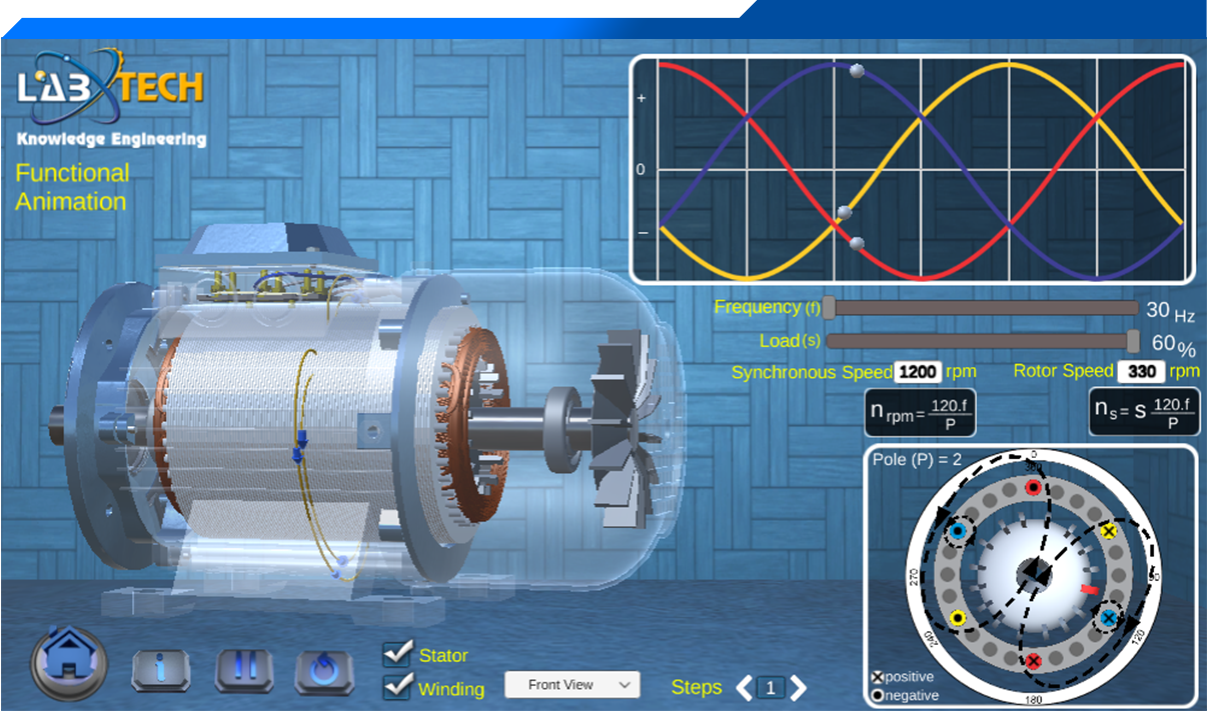
What are the benefits?
The Labtech-Academy can be used as a starting point for teachers and institutions to use digital learning for their students. It is easy to use and easy to integrate into the curriculum. If you wish to have our portal branded for your Institution you can contact the Labtech team at email:
Students like it ! – Virtual TVET is a modern and engaging way to learn and is a new way of learning created with modern connected digitally oriented people in mind. This type of learning will increase the leaner motivation and therefore make the teacher’s job easier.
Provides a quick upgrade to your Institution’s curriculum – The content is designed with up-to-date references and technologies. Virtual TVET is a quick way to present the latest information to your students. For example, in Automotive we feature newer technologies such as engine management, electronic fuel injection, ABS, hybrid vehicles etc. This will enable your students to increase their understanding about the new technologies in modern vehicles today.
Enables online and off-campus learning to “Flip-the Classroom” – This enables teachers and institutions to extend learning beyond the school. This will increase the amount of learning and provide a way in times of crisis for students to continue learning at home.
Keeps your Curriculum up to date - The Labtech-Academy is always adding new content to each subject area, so the number of topics will grow each year to reflect new changes and updates in technology. This is an easy way to teach the latest and newest technology.
Industry 4.0 Ready and facilitates Life-Long Learning – Today’s students can benefit from online learning as they will incorporate new learning habits which will be useful life skills. Life-Long-Learning is a feature of Industry 4.0. Students need the ability to self-study and master new technologies as they are deployed by Industry. Today’s fast pace of change demands constant learning in many positions in order to keep relevant. So in fact the student will be learning as he will be working in the future.
Enhanced Assessments – Virtual-TVET features traditional and innovative assessments which provide the teacher with a more complete view and understanding on how each student is learning and progressing. This information can be used for grading and for also assisting the student to overcome any difficulties that they maybe facing in understanding the subject matter.
Helping the Teacher - Virtual TVET is designed to assist the teacher by helping the student through the theory and difficult or tedious parts of the learning process. This reduces the amount of the teacher’s time spent on lectures, remedial learning and grading so that they can concentrate on mentoring practical skills in the lab.
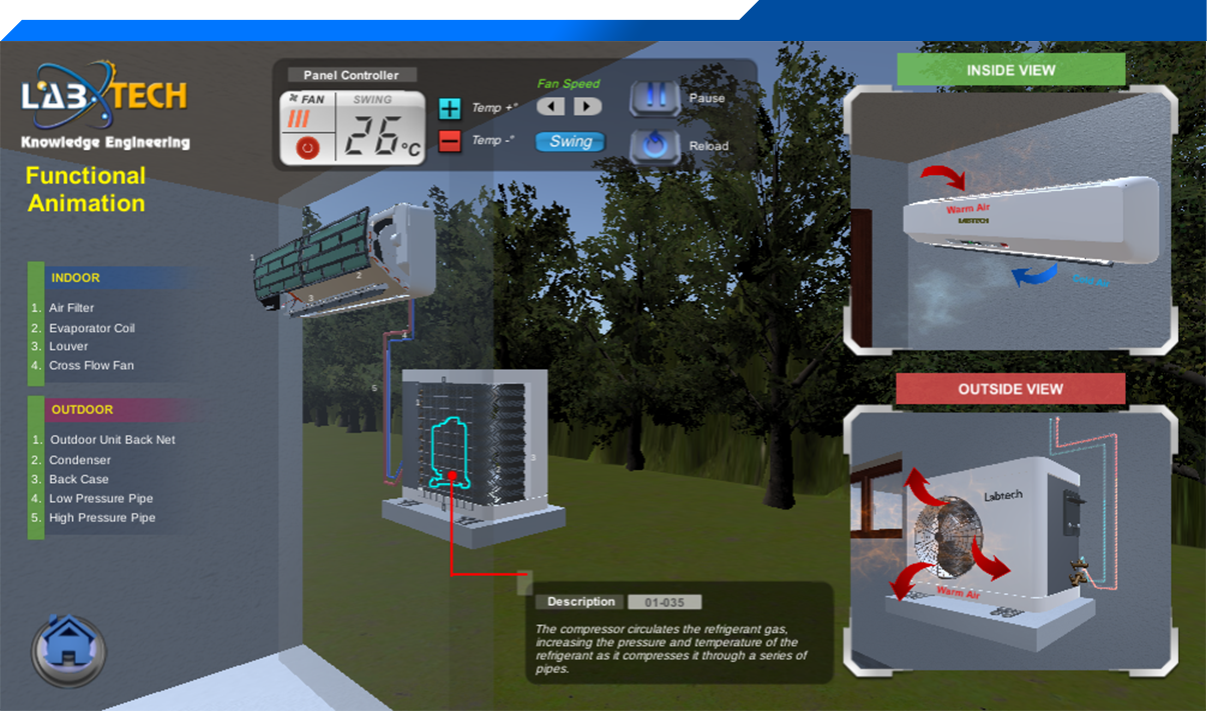
How does it improve learning?
- Competency based: Improving competency through interactive learning and formative assessments. For employers, it is important that the learners are competent and have mastered their knowledge and tasks.
- Enhanced Quicker Learning: Speeding up learning by individualized instruction and visualization ensures that complex principles are easier to understand.
- Differentiated Learning: Allows the learners to take the time required to fully understand each topic without burdening the teacher. Allows for different learning pathways and self-paced learning.
- Deeper Learning: Learners acquire deeper knowledge in the learning process and are able to go further in their understanding and exploration of the topics than they would be otherwise able to do.
- Flexible Learning pathways: The learner can take his time and learn at his own self pace and explore the learning elements in an order or sequence that suits him. He can repeat as many times as he likes until he is satisfied with his knowledge and skill development.
- Strengthens Fundamental Concepts: Through process and theory animations and simulations, learners can visualize and grasp the concepts more clearly and quickly as well as seeing the interrelationships.
- Transitional Learning: The interactive modules assist the learner to understand and apply concepts and fundamentals to real applications.
- Skills Cluster Approach and Cross Training: learners can acquire additional skills or knowledge in areas related to their main area of study. This can help create multi-skilled interdisciplinary knowledgeable learners which are in high demand by Industry 4.0. For an example in cross training, the automotive technician can also take courses in electronics which will be very useful for a more in-depth understanding in this rapidly changing field.
- Formative Assessment tools: This assists the learner to develop true mastery of knowledge and skills. Our formative assessments are designed to get the learners as close to 100 percent retention of knowledge and skills as possible.
- Learning on Demand: Anywhere and Anytime - The online Labtech-Academy allows the learner to study effectively off campus and to prepare for their lessons and practical work at the campus. Learning is continued outside of the classroom or lab.
- Learning process similar to new work processes (INDUSTRY 4.0 READY): Using technology for teaching and learning will be similar to how industry and business are currently transforming for Industry 4.0. Continuous learning is a key feature of Industry 4.0 as it is evolving rapidly.
- Triangulation of learning for guiding the individual to learn what he has not yet clearly understood: This feature is built into our formative assessment program. It is where we approach learning in different ways from various tangents (points of view) to strengthen understanding where needed.
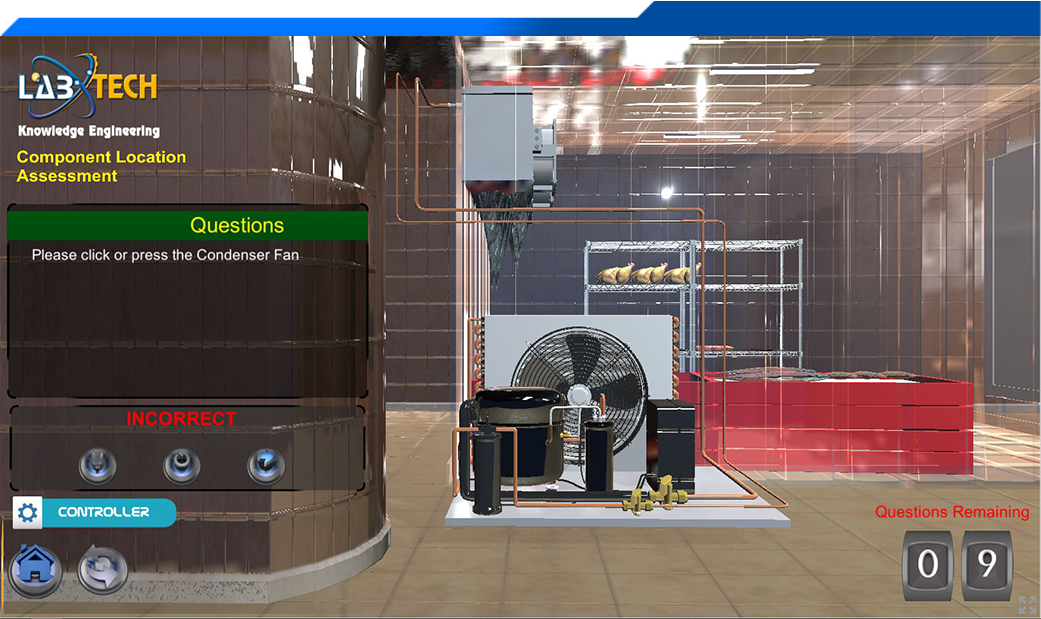
Blended Learning Approach
Labtech’s Virtual Digital Content for Vocational and Technical Learning provides extensive and engaging course content in core TVET areas. Labtech’s digital content is designed to meet the needs of learner in the 21st Century as well as Industry 4.0 (IR 4.0).
It provides a platform for schools to expand learning beyond the class so that they may learn “Anytime-Anywhere”. Younger people are learning differently today, and we need to update our TVET delivery systems to match with the student’s new learning styles and preferences which is digital based. Industry’s needs are also moving quickly and we need to be able to update, alter and adapt these programs to make the graduates ready to work.
Our objective is to make learning relevant and fun through realistic 3D rendered models, animations and simulations. They feature comprehensive content with lots of references and exercises, differentiated learning via self-paced learning modules, realistic high-quality graphics and combines practical as well as theoretical exercises.
The balance between virtual and practical learning in vocational education is becoming a cutting-edge topic in education today. It is Labtech’s aim to create the best tools and content for true blended learning. This will be part virtual and part physical or hands-on.
Labtech is proud to be leading the way in this field by combining our own expertise built up over 30 years in vocational education together with the insights and research-based best practices for e-learning brought by our network of academic and industry partners. Our efforts have resulted in the most effective, innovative and comprehensive implementation of virtual and blended learning in the field of vocational education today. The power of Virtual learning is growing, and we are able to use it to speed up learning, make learning more in depth and make complex principles easier to understand.
Costs can also be significantly lowered by replaced many physical training systems in the labs or workshops and increasing their student throughput. All of these factors can improve learning and importantly lower the cost of technical and vocational education. So with VIRTUAL TVET, Learning can be made more efficient, Deepen knowledge and skills, take less time and dramatically reduce lab infrastructure development and operational costs.
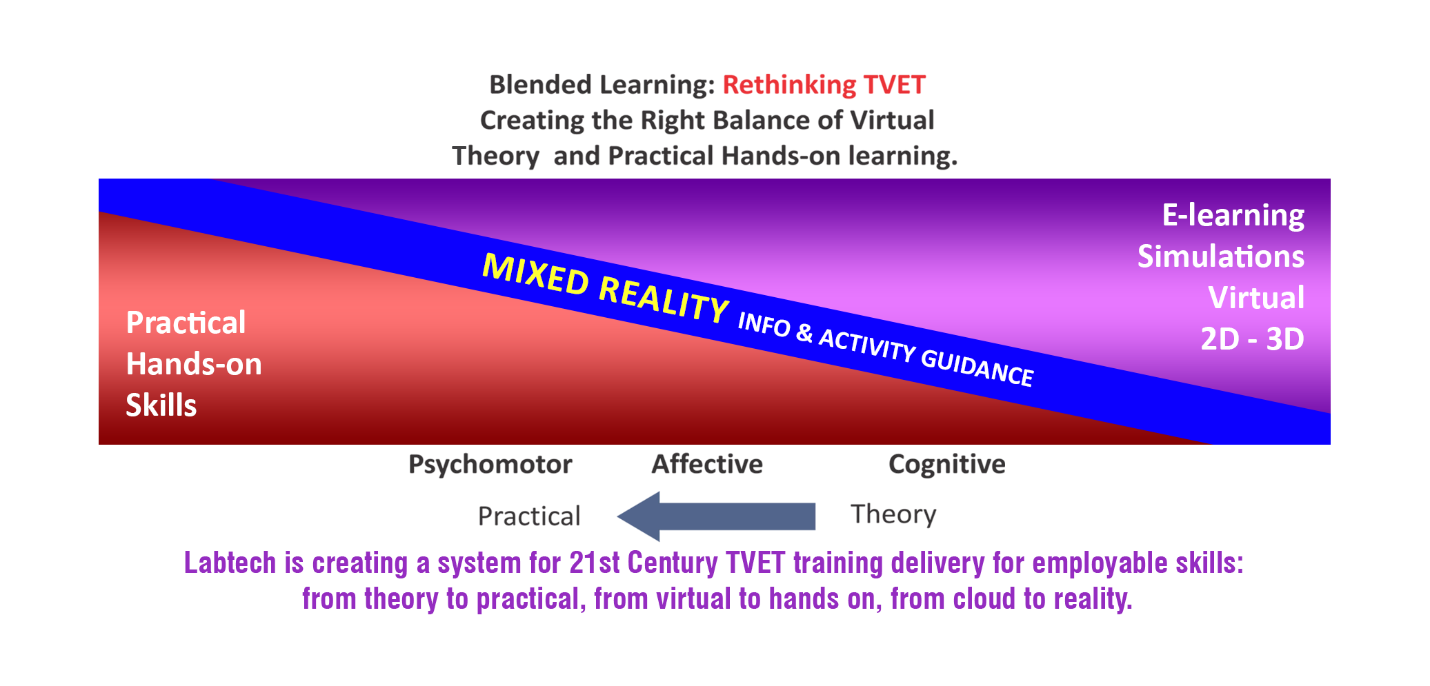
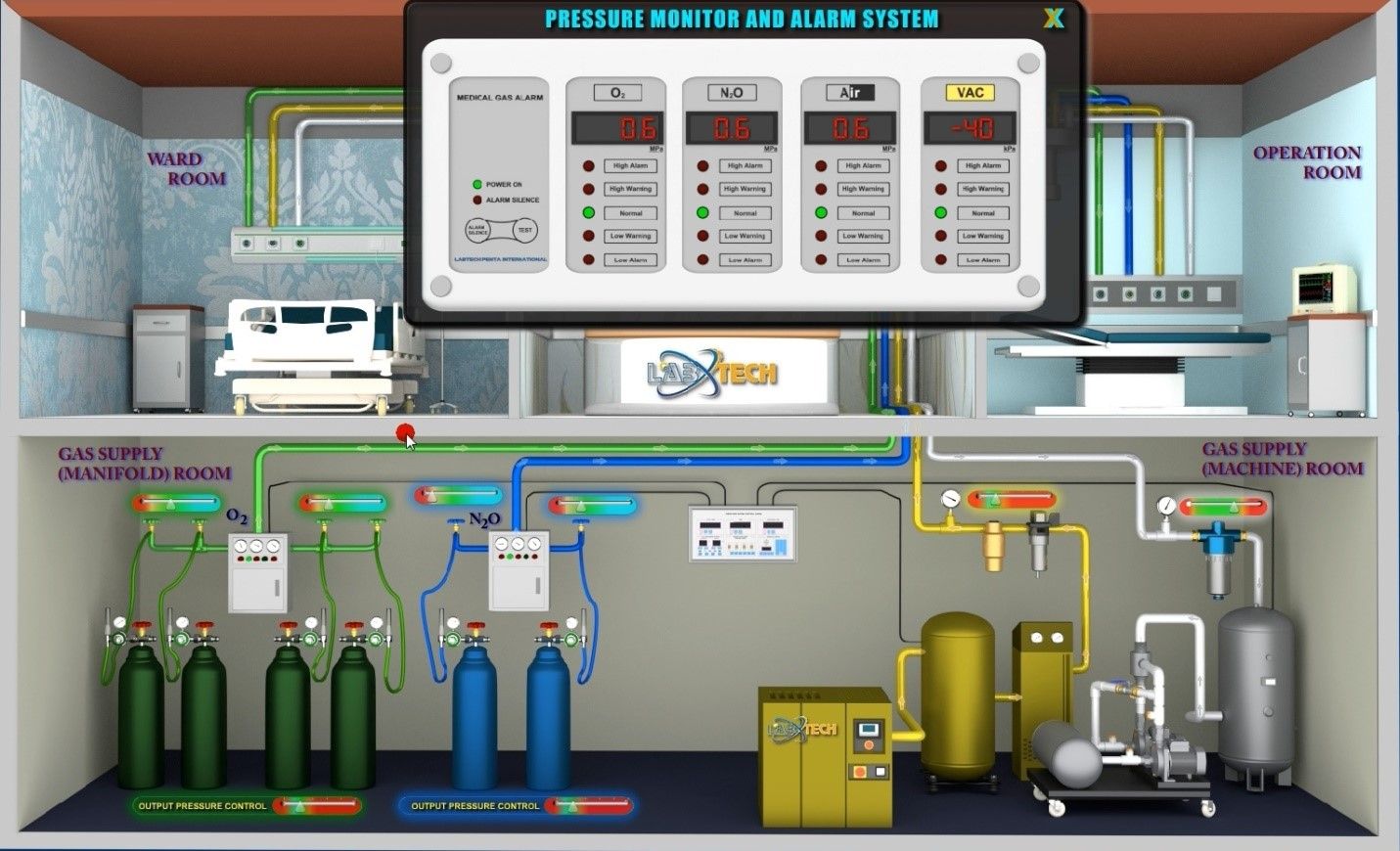
Why Labtech?
Labtech is in a unique position of having 30 years’ experience in developing the world’s largest range of technical and vocational training systems. We have developed over 1,000 training systems in seven key technology Areas. Labtech is one of only a very few companies in the world that is ISO certified for Research and Development of educational training systems. This ensures a high standard of consistency and innovation in our approach. We are also ISO certified in 8 other areas ranging from management, production, Quality Control, Customer Service and Training.
During this process, over the years, we have gathered, created and organized massive amounts training manuals, systems operational data, photos, videos, training models and a warehouse and factory full of technical parts and components. In order to do this innovative digital content right, we start with real industrial components and systems and then duplicate them down to the last screw in a Virtual 3D environment and then we make the virtual models operational which are able to be operated, taken apart and reassembled in a Virtual Manner. We then layer on our technical knowledge describing the system and its constituent parts, include videos, still photos or illustrations, glossaries and innovative new assessments. The following are the targeted areas for Virtual TVET development for our current and future content.
- Automotive and Transportation Technologies (Phase 1 already complete)
- Electrical and Industrial Control Technologies (Phase 1 under development)
- Electronics and Communication Technologies (Phase 1 under development)
- Air-Conditioning and Refrigeration Technologies (Phase 1 already complete)
- Information and Communication Technologies (coming soon)
- Renewable Energy and Green Technologies (Phase 1 under development)
- Foundational Skills and Knowledge for TVET Studies (coming soon)
- Bio-Medical or Med-Technician (coming soon)
- Mechanical Studies (coming soon)